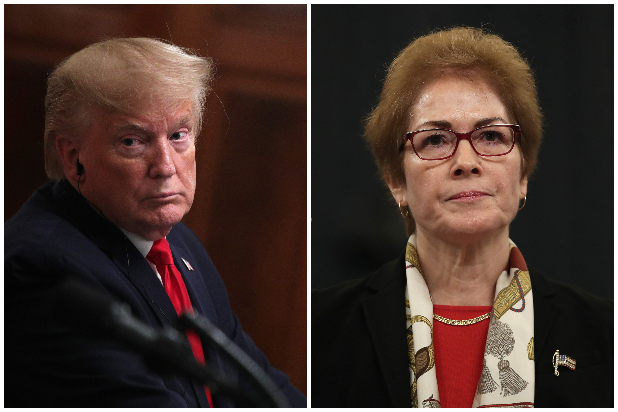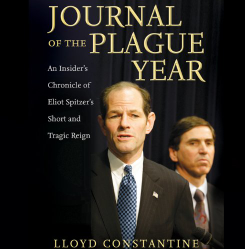Most lawyers and teachers of law know and have a responsibility to explain to others that lots of pure hogwash, pretending to be law, is being stated over and over again during the impeachment hearings.
Two, stated ad nauseum, and particularly pernicious, because the repetition apparently has gotten some who should know better to repeat them, are that circumstantial evidence is not admissible and probative and that a President can fire “at will” government officials “at any time for any reason.”

Volodymyr Zelensky & Donald Trump
Listen up and know it ain’t so, every time you hear that Trump CAN’T be impeached (think indicted) for attempting to bribe Ukrainian President Zelensky into announcing investigations of the Bidens and Ukrainian interference in the 2016 U.S. elections with conditioned release of nearly $400 million of Congressionally appropriated aid to Ukraine. Money designed to save Ukrainian lives from Russian invaders and protect the United States in Russia’s war against America.

Fareed Zakaria
Another falsehood is that Trump CAN’T be impeached for attempting to extort Zelensky by withholding that aid and a Whitehouse meeting unless and until the baseless investigations were announced. Apparently, Trump had little interest in the actual conduct of such investigations – just in their conspicuous announcement, scheduled to occur on Fareed Zakaria’s “GPS” program on CNN in mid-September. CAN’T CAN’T because no witness has yet testified that Trump framed the bribery and extortion attempts in explicit “I will give you this if and when you give me that” and “you won’t get this until you give me that.” Nor has a witness yet testified that Trump instructed his agents to say those specific things to Ukrainian officials.
The basic lesson about the importance and admissibility of circumstantial evidence and the proven superiority of circumstantial over eyewitness evidence is taught in the first semester of law school. Yes, it has been proven more reliable. The circumstantial evidence here includes the dozens of times Trump and his agents asked Ukrainians to announce the investigations, the fact that the Whitehouse meeting never occurred, the aid was withheld until after the Whitehouse knew that a whistleblower complaint had been sent to Congress and that there were numerous government officials that had told the informant that the aid and meeting had been conditioned on delivery of the “deliverables.”
Not only is it hogwash that this evidence would not support an indictment, it would easily lead to conviction by any sentient and unbiased jury. No one seriously asserts the Republican members of the Senate are the latter. It would be conviction (removal) for mere “attempts” at bribery and extortion because Trump found out that he had been caught and then released the aid a few days before Zelensky was to appear and play Bojangles for Trump on CNN.

Adam Schiff
Another falsehood we constantly hear and surprisingly heard from witness Fiona Hill and Representative Adam Schiff during the November 21 hearing was that Trump can remove an ambassador (and other “serve at the pleasure” appointees) at any time and for any reason at all. Wrong, and its “wrongness” is being demonstrated as we write and read.
Say the bribe went the other way, with Zelensky offering and Trump accepting 25 million Ukrainian Hryvnias (are there any other kind?) and a luxurious dacha on Lake Yalpuh to fire the U.S. Ambassador. Firing for that “reason” would also constitute the crime of bribery and violate the good ‘ole emoluments clause. Bribery is one of three offenses mentioned specifically in the impeachment provisions of the Constitution.
OK Boomers, we experienced the Watergate impeachment inquiry and didn’t just read about it. For us, there are many very depressing comparisons with the current inquiry. One is how credulous Americans seem to have become.
Back then, when the Watergate tapes revealed Richard Nixon discussing all the illegal ways he and his henchmen[1] could cover-up their crimes with money, Nixon followed that discussion with a nervous and self-conscious “but that would be wrong.” Back then Americans understood the falsity of the disclaimer. And especially because the disclaimed tactics were employed.

Rose Mary Woods & Richard Nixon
On September 9, 2019, Trump knew that he had been caught in flagrante delicto and then told Gordon Sondland “I want nothing, I want nothing.” He later screamed the same thing on the Whitehouse lawn. That disclaimer was exactly equivalent to Tricky Dick’s in 1973. But in 2019, Trump starts out with acceptance from 35 percent of American voters and every Republican member of the House of Representatives.
The impeachment and trial in the Senate won’t determine de jure whether presidents can do anything they want at any time and for any reason. They CAN’T. It will determine whether de facto the U.S. Senate permits and encourages that.



0 Comments